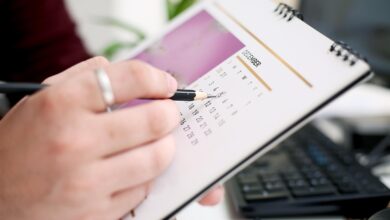
The Benefits of Using a Planner for Budgeting
Budgeting is an essential aspect of personal finance management that enables individuals to take control of their financial lives. Whether you’re planning for a major purchase, managing daily expenses, or simply trying to save more, a well-structured budgeting plan can make a significant difference. In today’s fast-paced world, where the flow of financial information can become overwhelming, using a planner specifically for budgeting offers a myriad of benefits. This article will delve into the advantages of employing a planner for budgeting, highlighting how it can cultivate discipline, enhance clarity, streamline financial goals, and promote accountability.
1. Organisation and Structure
One of the most profound benefits of using a planner for budgeting is that it offers an organised approach to financial management. Tracking income, expenses, savings, and investments becomes clearer when written down in an accessible manner. A planner can help break down the complexities of your financial situation into manageable sections, allowing for a structured overview of where money is coming from and where it is going.
By keeping all financial information in one place, planners eliminate the chaos often associated with handling multiple accounts and financial records scattered across various platforms. An organised structure reduces the likelihood of overlooking important details or miscalculating funds, thereby laying a strong foundation for effective budgeting.
2. Enhanced Clarity
A planner not only helps in categorising financial data but also enhances clarity regarding your spending habits. By reviewing your entries over a month or a year, you can easily identify patterns in your expenditures. This detailed insight enables you to determine which areas of spending may need tweaking.
For instance, regular entries might reveal an increasing trend in dining out, leading you to reconsider your eating habits and opt for cooking at home more often. Clarity does not just assist in recognising problems; it also allows you to see progress towards financial goals. Being able to visually track your savings or debt repayment milestones fosters a sense of achievement that can bolster your motivation.
3. Goal Setting and Alignment
Budgeting is not solely about monitoring current financial behaviour; it is equally about future aspirations. A planner provides a dedicated space to set, track, and adjust your financial goals. Whether you’re aiming to save for a holiday, purchase a property, or build an emergency fund, a planner allows you to allocate specific amounts towards these goals each month.
Setting goals and documenting them significantly increases the likelihood of achieving them. When you have a visual representation of your objectives and the steps necessary to reach them, your financial planning becomes more focused and intentional. A planner serves as a constant reminder of your aspirations, amplifying your commitment to achieving them.
4. Promoting Accountability
Having a tangible planner can instil a sense of accountability. When finances are simply numbers on a screen or accounting software, it can be easy to overlook inconsistencies or slip-ups. However, when you are required to manually enter every transaction and expense into a planner, you’re more likely to pay attention to your financial habits.
Additionally, sharing your planner with a partner or a trusted friend can foster a supportive environment for accountability. Discussing your budgeting progress and challenges with someone else can help maintain focus and commitment. External accountability can be a powerful motivator in sticking to your budget.
5. Flexibility and Adaptability
Another significant benefit of using a planner is its inherent flexibility. Life is unpredictable, and financial situations often change. Whether it’s a sudden expense, a loss of income, or a new financial opportunity, being able to adapt your budget to your current circumstances is paramount.
With a planner, you have the power to make adjustments as needed, without the constraints of rigid software or apps. You can easily erase or cross out figures, add annotations, or adjust your goals based on changes in your life. This adaptability encourages ongoing engagement with your budget, rather than viewing it as a static set of numbers.
6. Financial Literacy Improvement
Using a planner for budgeting can serve as a practical tool in enhancing your financial literacy. When consistently engaged in budgeting activities, individuals naturally start to learn more about financial terms, concepts, and strategies. This hands-on approach demystifies complex financial principles that may have previously seemed daunting.
As you explore different sections of your planner—such as investments, retirements, or savings vehicles—you inevitably gain insights that can improve your overall financial acumen. Greater financial literacy equips you with the knowledge to make informed decisions regarding investments, savings strategies, and long-term planning.
7. Encouragement of Mindful Spending
A planner encourages mindfulness in financial decisions. The act of physically writing down every expense can prompt you to think twice before making impulsive purchases. Each entry requires a moment of reflection, allowing you to assess whether a purchase aligns with your financial goals or is merely a fleeting desire.
Implementing this mindful approach can contribute to reduced emotional spending and promote healthier financial choices. Over time, you may find yourself more inclined to ask essential questions before making purchases, such as whether the item adds value to your life or if it’s required at all.
8. Stress Reduction
Financial stress is a common concern for many people, often stemming from a lack of clarity or overwhelming obligations. A well-maintained planner can alleviate this stress significantly. Knowing that all financial information is compiled neatly and systematically can provide peace of mind.
Moreover, as you track your progress towards goals, such as debt repayment or savings, you will likely experience a sense of relief and satisfaction. This can encourage a more positive financial outlook and reduce anxiety around money matters.
9. Educational Resource
Beyond personal use, planners can be excellent tools for educational purposes. For families, introducing children to budgeting through a planner can instil sound financial habits from a young age. Teaching kids to set budget goals, track their allowances, and visualise their spending can foster responsible money management that will benefit them throughout their lives.
In educational settings, budgeting planners can be useful for workshops, financial literacy programmes, or simple informational sessions. Offering students a practical method to engage with their finances can spark interest and equip them with skills necessary for future financial success.
10. Customisation to Individual Preferences
One of the beauty of using a planner for budgeting lies in its customisation possibilities. There is no one-size-fits-all approach when it comes to managing personal finances. Some may prefer a minimalist layout, focusing solely on essential income and expense tracking, while others may wish to include more detailed analyses such as cash flow statements or investment summaries.
Furthermore, planners can be adapted to suit individual preferences—whether you prefer traditional pen-and-paper formats, bullet journals, or digital planners. This level of customisation ensures that the system is intuitively suited to your style, making the budgeting process not only productive but enjoyable.
Conclusion
In a world characterised by fast-paced transactions and digital financial tools, the benefits of using a planner for budgeting remain ever relevant. The structure, clarity, and accountability that a planner offers facilitate a conscious approach to financial management. They prepare individuals to navigate the complexities of personal finance with confidence and grace.
As you cultivate the habit of budgeting through a planner, you are not merely tracking numbers; you are taking charge of your financial destiny. From better organisation to enhanced clarity, a budgeting planner can transform your relationship with money, empowering you to pursue your financial goals with intention and purpose. Investing time in a planner may well be the best decision you make for your financial health and overall well-being.




